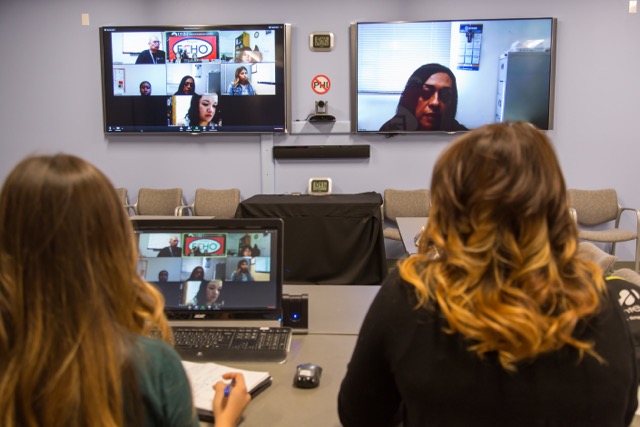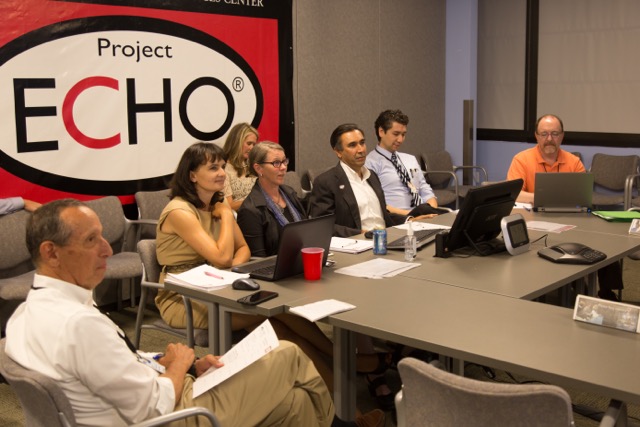The success of Project ECHO’s first program for hepatitis C treatment in New Mexico is a powerful example of how the ECHO Model saves lives by linking specialist networks to local providers, all around the world. Over 20 years, Project ECHO’s health programs have grown from a single weekly session focused on hepatitis C in New Mexico, to a now-global network of hundreds of specialized programs with participants in 195 countries.
Breaking Ground
In 2003, Dr. Thornton was beginning her practice as an internal medicine doctor; Deming was finishing residency; and Dr. Arora had a robust gastroenterology practice. Dr. Arora, busy with an idea for providing radically accessible hepatitis C treatment, pulled them on board to his new idea: a model for telementoring to get the right knowledge, to the right place, at the right time.
Dr. Arora: “We always wanted to serve rural populations, prisons, and people who couldn’t afford to see a specialist. Equity is the underlying principle of why we do ECHO.”
Deming: “It’s crazy to realize it’s been 20 years. At this point, we can see that a common thread for professionals involved in any ECHO program – all of the thousands that now exist – is they want to step up and fulfill a need in their community. The ECHO Model really enables that.”
The ECHO Effect
Dr. Arora: “The ECHO Model has established a historic precedent for the possibilities of sharing knowledge. This served as an example for so many other complex issues, such as very complex diseases like HIV and TB, and for education and even in mitigating climate change – issues the world has been struggling with for decades.”
Deming: “The ECHO Model created more of an impact on the population as a whole in New Mexico than I would have been able to do just seeing one patient at a time in my own clinic. Pharmacists, especially, aren’t usually treating hepatitis C but now we have a robust network, often in rural and underserved areas like Indian Country, who have learned how to do this. The ECHO team always knew what we wanted to do – but the success was still unprecedented.”
One of the least considered populations for hepatitis C treatment was incarcerated people. “When we started, not a single patient in the prison had ever been treated for hepatitis C,” says Dr. Arora.
Dr. Thornton took the lead with working with incarcerated populations, leading to the New Mexico Peer Education Program ECHO Program. “We started screening and realized hepatitis C infection and re-infection rates in the prisons were around 50 percent, which was a revolving door to infecting the general population, too. Now we treat 500 – 600 patients a year in all 10 prisons in New Mexico.” The Peer Education Program ECHO and related programs for Community Health Workers and Peer Social Workers are flagship New Mexico ECHO programs.

The Community Health Worker ECHO Program, pictured here, is an offshoot from the Peer Education Program that provides a variety of face-to-face training, telementoring groups, and individual teleconferences to bolster health networks. Photo Credit: Project ECHO
Serving Millions
When asked what she was most proud of, Deming shared: “The Hepatitis C ECHO started a ripple effect. Starting with just one ECHO program, now look where we are: global reach, a proven model, and millions served.”
“We all do this for the patients,” she continued. “I remember clearly a patient who hugged me when she came in for her follow-up. She was feeling well enough to play with her kids again. That’s the difference ECHO makes: reminding people they deserve this kind of care.”
Dr. Thornton: “I’m most proud of the community we helped to build and the longitudinal impact of that on equity: proving this can–and should–be done. We are all in this together.”
For more information about the New Mexico Peer Education Project, email the program team.
Featured Image Credit: Deming (left, behind red cup) Dr. Thornton (next), and Dr. Arora (second from right) consulting during a Hepatitis C ECHO Session. Photo Credit: Project ECHO, 2023.


